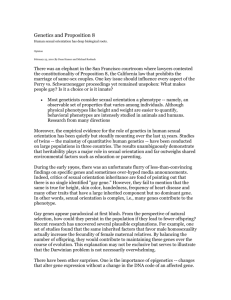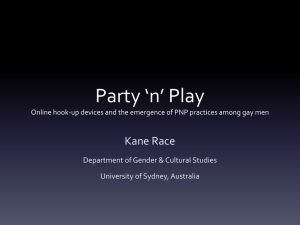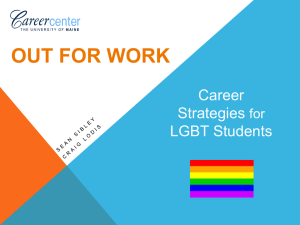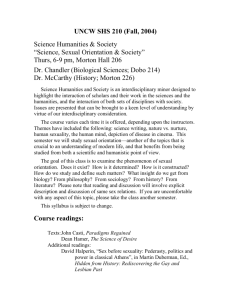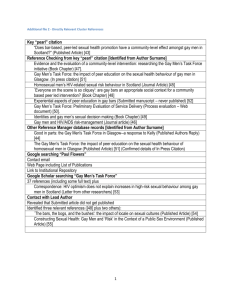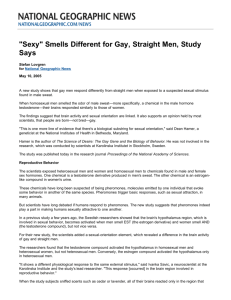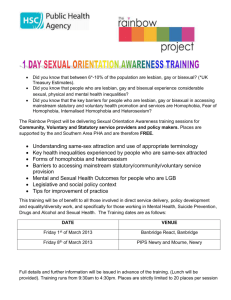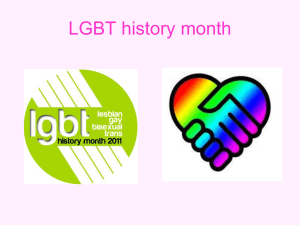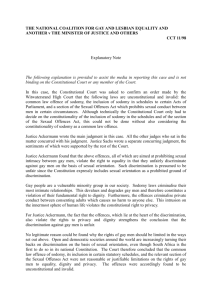More details
advertisement
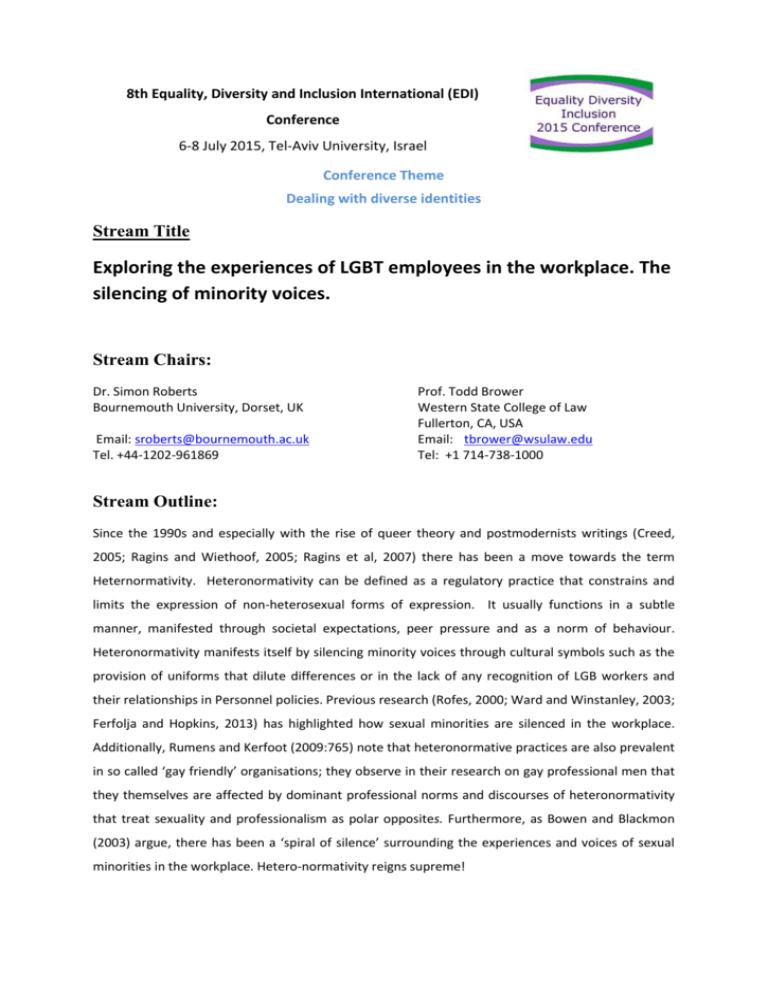
8th Equality, Diversity and Inclusion International (EDI) Conference 6-8 July 2015, Tel-Aviv University, Israel Conference Theme Dealing with diverse identities Stream Title Exploring the experiences of LGBT employees in the workplace. The silencing of minority voices. Stream Chairs: Dr. Simon Roberts Bournemouth University, Dorset, UK Email: sroberts@bournemouth.ac.uk Tel. +44-1202-961869 Prof. Todd Brower Western State College of Law Fullerton, CA, USA Email: tbrower@wsulaw.edu Tel: +1 714-738-1000 Stream Outline: Since the 1990s and especially with the rise of queer theory and postmodernists writings (Creed, 2005; Ragins and Wiethoof, 2005; Ragins et al, 2007) there has been a move towards the term Heternormativity. Heteronormativity can be defined as a regulatory practice that constrains and limits the expression of non-heterosexual forms of expression. It usually functions in a subtle manner, manifested through societal expectations, peer pressure and as a norm of behaviour. Heteronormativity manifests itself by silencing minority voices through cultural symbols such as the provision of uniforms that dilute differences or in the lack of any recognition of LGB workers and their relationships in Personnel policies. Previous research (Rofes, 2000; Ward and Winstanley, 2003; Ferfolja and Hopkins, 2013) has highlighted how sexual minorities are silenced in the workplace. Additionally, Rumens and Kerfoot (2009:765) note that heteronormative practices are also prevalent in so called ‘gay friendly’ organisations; they observe in their research on gay professional men that they themselves are affected by dominant professional norms and discourses of heteronormativity that treat sexuality and professionalism as polar opposites. Furthermore, as Bowen and Blackmon (2003) argue, there has been a ‘spiral of silence’ surrounding the experiences and voices of sexual minorities in the workplace. Hetero-normativity reigns supreme! We would therefore welcome papers that open this under-researched field of study. Novice researchers and practitioners alike are very much encouraged to submit papers from a variety of perspectives: including empirical research papers, and theoretical discussions from a range of disciplines such as, business studies, health, law and social science. Possible Themes include: Identity management, equality, trade unions and diversity, role of LGBT networks in organisations, sexuality at work, sexual minority experiences at work, role of friendship at work, pay inequality, health inequalities, discrimination, international comparisons, impact of equality law, gay masculinities and social constructions of gender, queer theory, the relevance of gender in organisations and the provision of social welfare services. Keywords: Sexuality, discrimination, diversity, equality, work, organisation Abstracts/papers: EDI Conference welcomes three forms of paper submissions to regular streams. Extended abstract: Customarily an extended abstract should be approximately 300-500 words including references. This is suitable for policy, intervention or research in its early stages of development. Developmental papers: These should be approximately 3000-5000 words, including references. Full papers: These are longer contributions approximately 5000 words including references. Abstracts and papers should be submitted electronically at: http://www.edi- conference.org/index.php The stream will require presentations at the conference of a maximum of 20 minutes long, with 10 minutes for questions and discussion. Data projectors will be available in each conference room. Important dates: Abstract/Developmental/full paper submission: March 1, 2015 on http://www.ediconference.org Response to authors (acceptance / rejection): April 15, 2015. Deadline for full papers and best paper nominations and submission of best papers to the relevant associated journal (as agreed by submitter): May 18, 2015. Full conference schedule will be available thereafter References Bowen, F. and Blackmon, K. (2003). Spirals of Silence: The Dynamic Effects of Diversity on Organisational Voice. Journal of Management Studies. 40(6), 1393-1417. Creed, D. (2005). Seven conversations about the same thing, in A. Konrad, P. Prasad & J. Pringle(Eds). The Handbook of Workplace Diversity. London: Sage, 371-400. Ferfolja, T. and Hopkins, L. (2013). The complexities of workplace experience for lesbian and gay teachers. Critical Studies in Education. 54, 1-14. Ragins, B. R., & Wiethoff, C. (2005). Understanding heterosexism at work: The straight problem. In R. L. Dipboye and A. Colella (Eds.), Discrimination at work: The psychological and organizational bases. Mahwah, NJ: Lawrence Erlbaum Associates, 177-202. Ragins, B., Singh, R., & Cornwell, J. (2007). Making the invisible visible: fear and disclosure of sexual orientation at work. Journal of Applied Psychology. 92(4), 1103-1118 Rofes, E. (2000). Bound and gagged: Sexual silences, gender conformity and the gay male teacher. Sexualities. 3(4), 439-462. Rumens, N. and Kerfoot, D. (2009). Gay men at Work: (Re) constructing the Self as professional. Human Relations. 62 (5), 763-786. Ward, J. and Winstanley, D. (2003) The absent presence: Negative space within discourse and the construction of minority sexual identity in the workplace. Human Relations. 56 (10), 1255-1280
